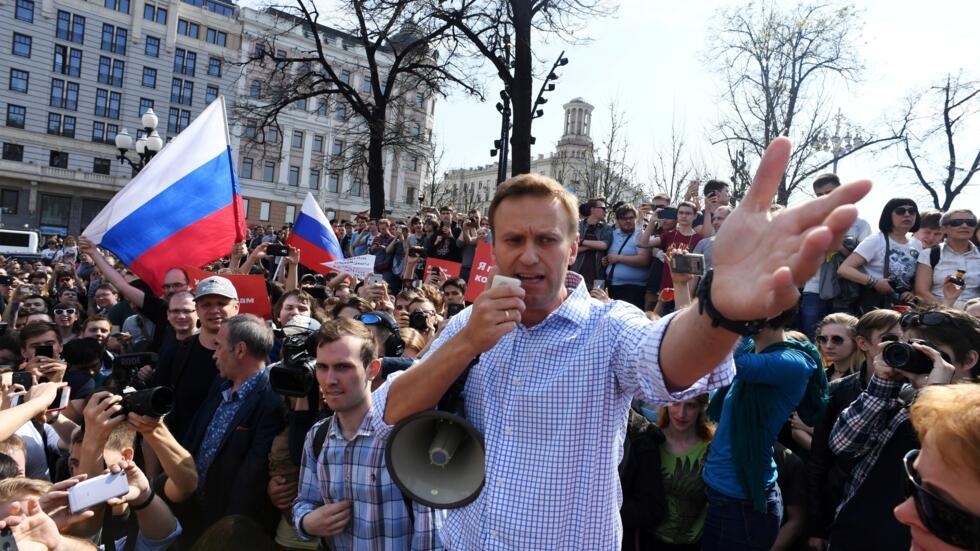
MOSCOW, Feb 16, 2024 (BSS/AFP) - The Kremlin's most prominent critic
Alexei Navalny died on Friday in an Arctic prison, Russian officials said, a
month before an election poised to extend Vladimir Putin's hold on power.
Navalny's death after three years in detention and a poisoning that he
blamed on the Kremlin deprives Russia's opposition of its figurehead at a time
of intense repression and Moscow's campaign in Ukraine.
Dissidents and Western officials blamed Putin and his government for the
47-year-old's death, which followed months of deteriorating health in harsh
detention conditions.
"Alexei Navalny was tortured and tormented for three years... Murder was
added to Alexei Navalny's sentence," Russian Nobel Peace Prize winner Dmitry
Muratov was quoted as saying by the Novaya Gazeta newspaper.
The death was announced by Russia's federal penitentiary service which said
Navalny "felt bad after a walk, almost immediately losing conciousness".
Russian news agencies reported that medics from a local hospital arrived
within minutes and spent more than "half an hour" trying to resuscitate him.
Navalny's wife, Yulia, said she held Putin personally responsible for her
husband's death and called on the international community to "unite and defeat
this evil, terrifying regime".
Navalny was Russia's most prominent opposition leader and won a huge
following with his campaigning against corruption under Putin.
The Russian leader -- who famously never referred to Navalny by name -- was
on a visit to the Urals on Friday and made no mention of the death in his
public appearance.
Kremlin spokesman Dmitry Peskov accused Western leaders of "absolutely
unacceptable" and "hysterical" reactions to Navalny's death.
Moscow authorities also warned the public against taking part in any
protests as videos shared online showed dozens of Russians laying flowers at
monuments to victims of political repressions in different Russian cities.
At least one person was detained for holding up a placard that appeared to
say "murderers" on it, according to a video posted by the independent Sota
Telegram channel.
"They won't let anyone go out in the streets. The government is terribly
afraid" of a "wave" of protests, Tatiana Stanovaya, founder of the R. Politik
consultancy, told AFP.
- 'Brutally murdered' -
One of Navalny's lawyers, Leonid Solovyov, told the independent Novaya
Gazeta paper that the Kremlin critic was "normal" when a lawyer saw him on
Wednesday.
In footage of a court hearing from his prison colony on Thursday, Navalny
was seen smiling and joking as he addressed the judge by video link. State
media reported he raised no health complaints during the session.
Speaking at the Munich Security Conference hours after news of her
husband's death, Yulia Navalnaya said Putin and his entourage "will be punished
for everything they have done to our country, to my family and to my husband."
Western governments and Russian opposition figures immediately blamed the
Kremlin.
US Vice President Kamala Harris said his death was "a sign of Putin's
brutality".
German Chancellor Olaf Scholz said Navalny had "paid for his courage with
his life", while Britain's Prime Minister Rishi Sunak said his death was a
"huge tragedy" for the Russian people.
The president of Latvia Edgars Rinkevics said he had been "brutally
murdered by the Kremlin" while French Foreign Minister Stephane Sejourne said
his death "reminds us of the reality of Putin's regime".
Ukraine's President Volodymyr Zelensky, battling Russian forces for the
past two years, said the Kremlin critic had been "killed by Putin".
- 'I'm not afraid' -
Navalny, who led street protests for more than a decade, became a household
name through his anti-corruption campaigning.
His exposes of official corruption, posted on his YouTube channel, racked
up millions of views and brought tens of thousands of Russians to the streets,
despite harsh anti-protest laws.
He was jailed in early 2021 after returning to Russia from Germany, where
he was recuperating from a near-fatal poisoning attack with Novichok, a
Soviet-era nerve agent.
In a string of cases he was sentenced to 19 years in prison on charges
widely condemned by independent rights groups and in the West as retribution
for his opposition to the Kremlin.
His return to Russia despite knowing he would face jail brought him
admiration.
"I'm not afraid and I call on you not to be afraid," he said in an appeal
to supporters as he landed in Moscow, moments before being detained on charges
linked to an old fraud conviction.
His 2021 arrest spurred some of the largest demonstrations Russia had seen
in decades, and thousands were detained at rallies nationwide calling for his
release.
From behind bars he was a staunch opponent of Moscow's full-scale military
offensive against Ukraine, and watched on, helplessly, as the Kremlin
dismantled his organisation and locked up his allies.
Dozens of his top supporters fled into exile and continued to campaign
against the offensive on Ukraine and growing repression inside Russia.
- 'Don't do nothing' -
Late last year, Navalny was moved to a remote Arctic prison colony in
Russia's Yamalo-Nenets region in northern Siberia.
Navalny said in January his daily routine included prison walks in freezing
temperatures, and that he had to use an open-air concrete yard 11 by three
steps wide.
Since being jailed in 2021, he spent more than 300 days in solitary
confinement, where prison authorities kept him over alleged minor infringements
of prison rules.
The last post on Navalny's Telegram channel, which he managed through his
lawyers and team in exile, was a tribute to his wife posted on Valentine's Day.
In a documentary filmed before he returned to Russia, Navalny was asked
what message he wanted to leave to the Russian people should he die or be
killed.
"Don't give up. You mustn't, you can't give up," he said.
"All it takes for evil to triumph for good people to do nothing. Therefore,
don't do nothing."